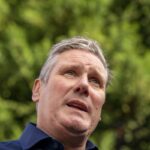The coronavirus lockdown was a “failure of public well being coverage”, an knowledgeable has stated because it emerged that prime scientific modellers have been by no means requested the way to keep away from the measure.
Mark Woolhouse, professor of infectious illness and epidemiology on the College of Edinburgh, stated lockdown ought to “at all times be a final resort” as he instructed a listening to the Authorities was not given a full vary of choices within the run-up to the November 2020 lockdown.
Prof Woolhouse, a member of the Scientific Pandemic Influenza Group on Modelling (SPI-M-O), was essential of a “go onerous, go early, go large” method favoured by some scientists when he appeared earlier than the UK Covid-19 Inquiry.
The query the way to keep away from lockdown was by no means requested of us and I discover that extraordinary
Professor Mark Woolhouse
He stated: “The harms of the social distancing measures – notably lockdown, the financial harms, the tutorial harms, the harms to entry to well being care, the harms to societal wellbeing, simply the way in which all of us perform, psychological well being – weren’t included in any of the work that SPI-M-O did and, so far as I might inform, nobody else was doing it both.
“I take the view that it could have been very useful if the Authorities stated explicitly, ‘We don’t wish to go into lockdown. What’s your recommendation? How can we each minimise the well being burden and keep out of lockdown?’ And we might have given loads of recommendation and all the opposite issues you can do apart from lockdown.
“The query of the way to keep away from lockdown was by no means requested of us and I discover that extraordinary.”
Prof Woolhouse stated the Scientific Advisory Group for Emergencies (Sage) “didn’t talk the seriousness and urgency of the scenario because it developed in January and February” within the minutes of its conferences.
Referring to the phrase “going early, going onerous”, which was adopted by members of Sage in addition to Sir Patrick Vallanceformer chief scientific adviser to the Authorities, Prof Woolhouse stated “I bear in mind, Patrick and others repeated it a number of occasions: ‘Go onerous, go early and go wider than you’ll have’.
“Now that, for me, is an efficient maxim in a specific scenario the place your strategic goal is to eradicate the virus – you’re going to try to clear it out utterly. That’s what was accomplished with Sars in 2003.
“I didn’t assume from very early on that eradicating the virus was even the remotest chance. Through which case this ‘go onerous, go early, go large’ goes to imply extreme restrictions.
“I used to be at all times from early on in looking for a sustainable intervention and so my maxim is ‘if you happen to go early, you don’t must go so onerous’.”
I feel it is truthful to explain lockdown, not as a public well being coverage, however as a failure of public well being coverage
Professor Mark Woolhouse
Prof Woolhouse stated he supported lockdown on the time it was launched as a result of speedy doubling occasions of hospital admissions and deaths.
However in his witness assertion, he stated that with hindsight he questioned whether or not the lockdown was mandatory.
Drawing on knowledge on the place folks have been spending their time within the week earlier than lockdown, he stated the period of time folks have been spending exterior their properties had “fallen off a cliff”.
He stated he had not seen “any good evaluation” that the stay-at-home order was the “killer punch that was actually wanted”.
In his assertion, Prof Woolhouse wrote: “I feel it’s truthful to explain lockdown, not as a public well being coverage, however as a failure of public well being coverage.
“(Lockdown) is what you do when all these different issues you already know you are able to do haven’t labored, it’s a final resort and it ought to at all times be that for my part.”
Prof Woolhouse added: “Within the build-up to that November lockdown in Englandas far as I might see, Sage was merely telling the Authorities it ought to lock down.
“I used to be saying ‘earlier motion could be a much less drastic motion, we don’t must lock down and, the truth is, there’s good proof now that that lockdown was not strictly mandatory’.
“We might have accomplished far more to keep away from it if we took an early motion.”
I feel authorities was not given, within the construct as much as that lockdown, the complete vary of coverage choices that ought to have been given
Professor Mark Woolhouse
Prof Woolhouse stated he didn’t consider that view was communicated to Sage, including: “They have been of this ‘more durable than you need, sooner than you need, wider than you need’ standpoint, which was clearly one thing the Authorities was resisting.
“I feel Authorities was not given, within the build-up to that lockdown, the complete vary of coverage choices that ought to have been given.”
He stated it was a “tragedy” that measures “properly past shielding” have been “overpassed through the pandemic”.
He instructed the inquiry the carers of susceptible folks ought to have additionally been protected through the disaster.
“How can we defend (susceptible folks) finest? By defending their carers.
“The folks they need to are available contact with should even be virus-free. That is named cocooning, the place you defend the folks across the folks you’re attempting to guard.”
The dynamics of the virus in these settings have been completely different and lockdown didn’t have such a robust impact in these settings because it did in the neighborhood
Professor Mark Woolhouse
Prof Woolhouse added: “I’ve to say this is without doubt one of the events the place I turned very, very pissed off with Sage.
“I don’t assume they regarded on the cocooning proposal. One thing that I consider would have labored and, so far as I can inform, it was by no means, by no means thought-about by them.”
He instructed the inquiry that lockdown didn’t have such a robust impact in hospitals and care properties.
“What lockdown did was drive down transmission charges within the wider neighborhood.
“All of us who needed to keep at dwelling, we weren’t transmitting the virus, however inside a hospital, there are many precautions, however they do have to hold on. And the identical with care properties.
“So the dynamics of the virus in these settings have been completely different and lockdown didn’t have such a robust impact in these settings because it did in the neighborhood.”









